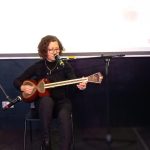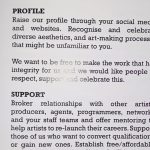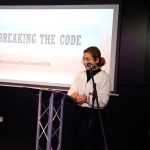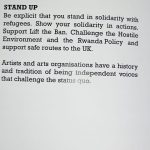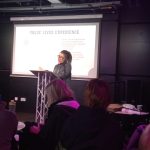Since the second half of the 20th century, the arts and cultural sector has sought to work with artists as an act of solidarity so that their programmes better reflect the diversity of the UK. However, despite examples of excellent work in this field, artists often feel the relationship with arts organisations is characterised by structural inequity.
Breaking the Code is a research project led by Stella Barnes and supported by the University of Manchester through the Simon Industrial Fellowship. The University set up the Simon Fund in 1990 to provide opportunities for people employed in industry, the public sector and the third sector to take a fixed-term placement at the University. The bid to set up this Fellowship was carried out in partnership with Alison Jeffers in the Drama and Film Department at the university.
Breaking the Code explores the inequities in the arts and cultural sector through the eyes of artists who have settled in Greater Manchester and who make creative work in the city region. The project has created a platform for a positive dialogue between artists, arts and cultural leaders, academics, and policymakers.
Stella Barnes was awarded the Simon Fellowship in 2023. She has a long history of working with communities and artists who have experienced forced migration, including the Director of Participation at London’s Oval House and, more recently, as Creative Director at Community Arts North West. The fellowship has enabled her to conduct research with a focus group of 16 artists from nine countries of origin who have lived in the UK for between one and 25 years. Their art forms and roles include theatre, dance, circus, visual arts, photography, design, creative writing, journalism, publishing, arts management, producing, participation, creative facilitation and academia.
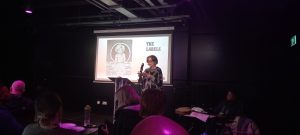
The project is also closely linked to PhD candidate Ambrose Musiyiwa’s research, Listening To The Voices Of Refugee Artists.
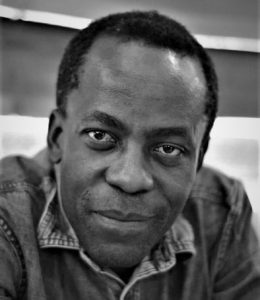
The focus group worked together between November 2023 and February 2024, utilising Participatory Action, Research, Co-Creation, and Systems Change Methodologies. The group used different creative forms and methods to describe their experiences navigating the UK’s arts and cultural sector.
The research programme acknowledged that artists have the potential to be catalysts for innovation in the sector. Yet, research suggests that they are excluded and continue to be stereotyped and compartmentalised, which means their cultural production is at the margins.
One outcome of the research project was a set of illustrations called The Code, captured by Tahmineh Khorami, one of the focus group members. Tahmineh worked closely with Stella to develop the Breaking the Code zine, which included illustrations and the artists’ words to explore the barriers they face when working in the UK.
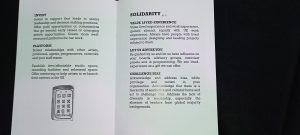
On 27 February, Breaking the Code, an artist-led event was held at Contact. The event brought together arts and cultural institutions, academics, policymakers, and artists to work towards better inclusion of artists with lived experience of forced migration. It aimed to create a positive dialogue to encourage system change to better include artists.
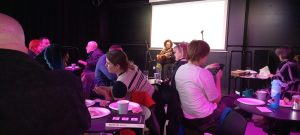
The event featured presentations and performances from focus group artists Emmanuela Yogolelo, Parisa Pirzadeh, Masresha Wondmu and Fariba Taghypoor, as well as University of Manchester PhD candidate Ambrose Musiyawa and Simon Fellow Stella Barnes.
The presentations from the artists centred around a manifesto they created: Instructions For Code Breakers.
Artists expressed the need for organisations to raise artists’ profiles online and recognise and celebrate diverse aesthetics and creative processes that may be unfamiliar.
Artists want to be free to make work with integrity, which would be respected, supported, and celebrated by organisations and, in turn, audiences.
Artists asked organisations to broker relationships and networks with fellow artists, producers, agents, and programmers and offer mentoring to help them re-launch their careers in the UK.
Artists expressed the need for free or affordable studio space, rehearsal space and recording facilities and access to funding to create and present work.
Artists said:
Arts organisations need to reach out to more artists like us.
Everything was new to me. Thank you for being so inclusive and seeing artists as artists without a label.
Wanting the visibility to be greater. Take more space, be loud, be proactive.
The findings need to be shared more widely with organisations that commission artists. We need to find ways to get the information we heard today to the right people and institutions that might be able to help.
A key point in the presentations was acknowledging and celebrating that many artists had successful artistic careers with a body of respected work and expertise before coming to the UK.
A significant issue was artists being positioned as outsiders, victims, and unprofessional. Stereotypes are unwelcome – they are hurtful, unfair, and untrue, and place them as ‘other’. Artists want to be equally placed in the centre, not on the peripheries.
Social justice is critical; artists ask that arts organisations stand in solidarity by supporting campaigns like Lift the Ban and challenge the hostile environment, which results in policies such as the Rwanda scheme and unsafe routes to the UK to seek sanctuary. This solidarity is rooted in the long history of artists and arts organisations being independent voices challenging the status quo.
A key objective of the event was for attendees to gain a better understanding of the challenges artists face in the sphere of arts and culture.
Attendees at the event commented:
I have been inspired in new ways by today’s event, particularly in thinking of ways to make change and recognise my responsibility in conscious inclusion and solidarity actions.
These events should be mandatory for cultural and arts organisations.
I heard others like me talk and agree on what they need to make their artistic lives better now and irrefutably in the future
I will try to work with artists from refugee backgrounds rather than Western artists. I will also talk to the School of Art at my university about residency opportunities.
Breaking the Code was supported by the Department of Drama and Film in the School of Arts, Languages, and Cultures. It is a partnership between the University of Manchester, Community Arts North West, and Creative Manchester.
Photos by Jamal Jameel.
